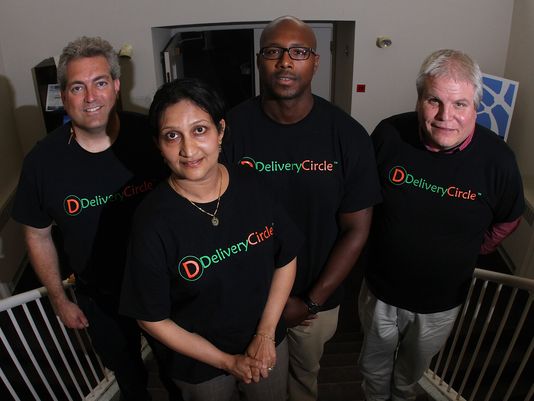On the Internet, everything is for hire. Such is the philosophy behind the burgeoning sharing-economy ecosystem and its latest aspirant, DeliveryCircle.
In an era where you can rent out your car with RelayRides, or hire somebody to do your grocery shopping with Instacart, why not have somebody who uses their own vehicle to deliver any product or item to your doorstep?
This seemed like the next logical step for Vijaya Rao, founder and CEO of DeliveryCircle. A native of Mumbai, India, Rao comes from the IT world, where she worked as a professional with Fortune 500 companies for over 22 years.
With such a busy work schedule, Rao longed for a service that would deliver local products right to her home. Bitten by the entrepreneurial bug, Rao left her job in February and invested all her money into DeliveryCircle.
###
Here’s how it works.
DeliveryCircle uses a community-centered approach that leverages the needs of merchant, customer and delivery-driver to provide a delivery service that is mutually beneficial to all, Rao said.
The startup builds a network of drivers in the community by seeking out local commercial drivers and agencies. The drivers are screened for criminal and driving records, and all must have liability insurance. Once that’s established, DeliveryCircle markets to businesses that have a need for delivery, but whose demand is variable and unpredictable. Then DeliveryCircle promotes this service to consumers. The entire delivery can be done on the DeliveryCircle website, with customers selecting their preferred driver, location of delivery and time of delivery.
The cost of delivery depends on the driver selected. Typically, the price ranges from about $7 to $15 for a 20-mile radius for a consumer-initiated order. For a business service, a delivery within a 50-mile radius would vary from about $15 to $90 depending on weight, with an additional charge for deliveries of more than 50 miles.
Most deliveries are business to business, such as an auto parts shop scheduling a delivery to pick tires up from a warehouse or a driver delivering office supplies to a local business.
“We are coming into a space that benefits the whole community,” said Rao. “We have to use our technology in such a way that we allow communities to help themselves.”
###
In April, DeliveryCircle joined the New Castle County Emerging Enterprise Center, a small business incubator linking emerging entrepreneurs with technical assistance, low-cost office space and a Rolodex of seasoned business professionals. Since then, DeliveryCircle has spread into New Jersey, Pennsylvania, Maryland, New York, Washington, D.C., and most recently, Chicago.
Rao’s model of monetizing one’s personal vehicle as an asset is nothing new to the sharing-economy market which already includes transportation apps like the aforementioned RelayRides, Uber and Lyft. Nor is the idea of having strangers perform tasks for you (see: TaskRabbit, Zaarly).
In Chicago, the startup even faces a direct competitor, WeDeliver.
What makes DeliveryCircle unique is that its model takes an established labor pool and gives it access peer-to-peer services, Rao said. While Uber tends to take cab fares away from professional drivers, DeliveryCircle allows professionals to subsidize their incomes by performing deliveries on their own time.
For instance, transportation companies have a term called “dead head,” where they drive a customer to the airport, for instance, but have to drive all the way back with an empty load. In steps DeliveryCircle, and the chance to earn some extra revenue.
That is not to say that independent contractors cannot become a part of the DeliveryCircle work force.
“The premise of this model is to use commuters or anyone that’s already on the road or going to be on the road at certain times to leverage them to deliver packages given unused trunk space,” said Rao.
However, DeliveryCircle owes it’s expansion to the development of strategic partnerships with transportation companies.
The company was able to break into the Chicago market by partnering with the Woman With Drive Foundation (WWDF), an organization that provides women in need with cars to help them gain independence. “We want to do more of these types of partnerships where it makes sense and helps the community,” said Rao.
###
DeliveryCircle is also in the process of developing a mobile app that should be available in the coming weeks. The app will utilize a geo-positioning map with the locations of all available drivers, allowing customers to schedule deliveries based on drivers’ positions in relation to the location of the delivery.
While tensions continue to mount between regulators and sharing-economy startups, DeliveryCircle looks to continue its expansion into national and international market.
Could DeliveryCircle be the next big sharing-economy business? Rao certainly thinks so.
“In two to three years I see us as a global brand,” said Rao. “I want DeliveryCircle to be a household name. We are at the point where this can be scaled up nationally if we had the right funding.”







